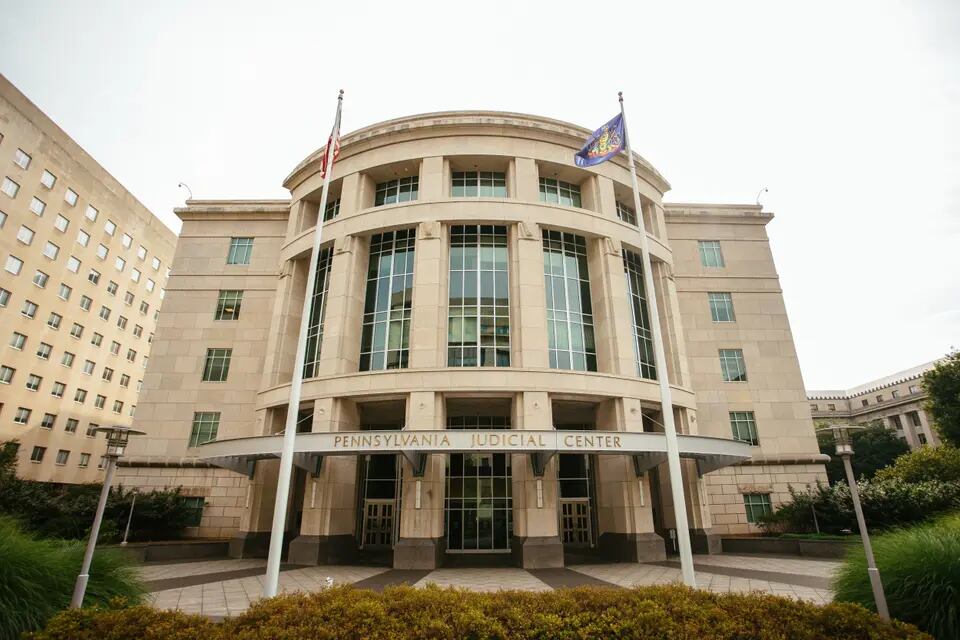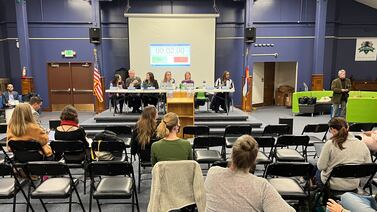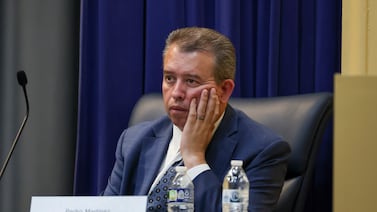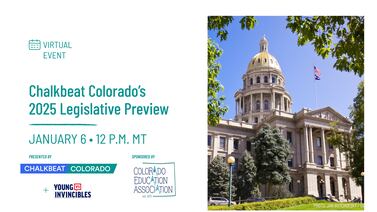Sign up for Chalkbeat Philadelphia’s free newsletter to keep up with the city’s public school system.
Education advocates want the state to hike education spending by $2 billion in the upcoming budget, saying that is the minimum necessary to start fixing a funding system that a Commonwealth Court judge ruled last year is unconstitutional.
In addition, Pennsylvania needs to invest additional capital funds to help districts update school facilities and expand access to preschool, according to a statement from the Education Law Center and the Public Interest Law Center, which represented the plaintiffs at the four-month trial. The proposal is also supported by PA Schools Work, a statewide coalition of groups that advocate for fair school funding.
The demands come a week before the Basic Education Funding Commission — a bipartisan group of legislators and state officials — is scheduled to release its report based on hearings it held across the state in response to Judge Renée Cohn Jubelirer’s ruling, and as the state’s annual budget process gears up.
The groups held a press conference Thursday to outline their desires for education spending. If Gov. Josh Shapiro and state lawmakers fall short, “we are prepared to go back to court to uphold the rights of those communities,” said Deborah Gordon-Klehr, executive director of the Education Law Center.
After a $2 billion education funding increase in the 2024-25 budget, the groups say an additional $1 billion should be added in each of the next four years, which they said will allow the state to close a $6.2 billion “adequacy gap” by 2028-29. Taking decisive action now is necessary “so that children currently in school will see the benefits,” they said.
When lawmakers approved the current state budget, they enacted an increase in basic education spending of $567 million, which combined with other aid increases brought total K-12 spending to $10 billion.
In February 2023, in her ruling on a lawsuit that several plaintiff districts and others filed in 2014, Jubelirer said the state contribution to school funding — meant to offset wealth disparities among districts — is both inadequate in the overall amount of money allocated and inequitable in how it is distributed. She concluded that as a result many students are deprived of their constitutional right to a “thorough and efficient” system of education.
At the trial, educators, experts and students described the impact of inadequate funding: large classes, insufficient counselors, outdated equipment, a lack of libraries, and teacher shortages due in part to inadequate pay. The defendants — the governor and legislature — eventually decided not to appeal Jubelirer’s ruling, and instead set up the commission to explore how to comply.
In a November letter to the funding commission, the group said that the General Assembly must determine “how much funding is needed to provide each child a constitutionally adequate, comprehensive, contemporary and effective education,” as well as determine the needs of each of the state’s 500 districts.
Experts testified during the trial that Philadelphia’s shortfall is in excess of $7,000 per student. According to the groups’ data, Philadelphia has a total “adequacy shortfall” of nearly $1.6 billion. Under their plan, the district would get an increase in state funding for 2024-25 of $500 million, as well as $250 million the next year. That additional money could go a long way toward helping new Mayor Cherelle Parker’s ambitions to implement year-round school and a longer school day.
They also noted that Shapiro, when he was attorney general, filed an amicus brief for the funding lawsuit that supported the plaintiffs’ claim of inadequate funding.
“Every child in our Commonwealth should have access to a high-quality education and safe learning environment regardless of their zip code,” he wrote in the 2022 brief. “Many Pennsylvania schools are not able to provide the level of education required by the Constitution—not for lack of trying, but for lack of funding … It is past time for the General Assembly to step up, comply with its constitutional obligations, and give our public schools the funding they need to educate our children.”
The advocates also released polling data from last year showing that most people think the current system is unfair, and that people did not oppose raising more state revenue to fund state school aid increases, as long as the burden fell on wealthier taxpayers.
In Pennsylvania, however, the state income tax, which raises most of the money that helps underwrite schools, is a flat tax — the same rate regardless of income. Courts have ruled that imposing a graduated tax, which would have higher rates for those making higher incomes, violates the state’s “uniformity” clause.
Donna Cooper, executive director of Children First, said during the press conference that according to the polling, citizens “know what is going on, they know about inequity,” and say officials “should do more to ensure the state is sufficiently funding schools.”
Noting that this is an election year and Pennsylvania is a swing state, she said while that sentiment is strongest among self-described Democrats, polling showed that 52% of Republicans also agreed with that statement.
“There is really a large amount of consensus on what is broken about this system,” said Public Interest Law Center attorney Dan Urevick-Ackelsberg, who argued the case before Jubelirer, adding that state officials need to change their mindset about education funding.
“It’s no longer a matter of political convenience,” he said at the press conference, “but a matter of what students are constitutionally entitled to.”
Dale Mezzacappa is a senior writer for Chalkbeat Philadelphia, where she covers K-12 schools and early childhood education in Philadelphia. Contact Dale at dmezzacappa@chalkbeat.org.







